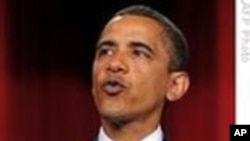<!-- IMAGE -->A group of 26 Libyan students and their teachers will travel to Huntsville, Alabama at the end of this month to learn what it is like to be an astronaut. The Space Camp program, coordinated under the U.S. – Libya Science and Technology Cooperation Agreement, is one example of the ways that the U.S. seeks to collaborate with Muslim-majority countries on science and education.
"In ancient times and in our times, Muslim communities have been at the forefront of innovation and education," President Barack Obama said in a speech last month in Cairo. The President called for continued and increased cooperation in the areas of science and technology:
"We will launch a new fund to support technological development in Muslim-majority countries, and to help transfer ideas to the marketplace so they can create jobs. We will open centers of scientific excellence in Africa, the Middle East and Southeast Asia, and appoint new Science Envoys to collaborate on programs that develop new sources of energy, create green jobs, digitize records, clean water, and grow new crops.”
The President underscored that Americans are ready to do all these things in partnership with citizens and governments, institutions and businesses.
Not far from where President Obama gave his landmark address, Egypt and the U.S. had already broken ground on a project to refurbish and establish an oceanographic station on the Red Sea. Featuring an educational center and aquarium, the station will have laboratories and quarters for visiting scientists.
The U.S. has also helped develop a program to assist technology entrepreneurs in bringing new technologies into the marketplace, called the Egypt Science and Technology Initiative. Four new Egyptian technologies were selected out of 400 projects for development as start-up companies. International business plans have been created for the new technologies and there is hope that the projects will create jobs in both U.S. and Egyptian economies.
The United States is also collaborating on a range of scientific matters with a number of Muslim-majority countries that have signed comprehensive bilateral Science and Technology Cooperation Agreements. These include Egypt, Libya, Algeria, Morocco, Tunisia, Jordan, Saudi Arabia, Pakistan, and Bangladesh. Negotiations for additional framework Agreements are also underway with Kazakhstan, Uzbekistan, and Azerbaijan.
The U.S. looks forward to expanding its engagement with the Muslim community on science and technology in the years to come.
"In ancient times and in our times, Muslim communities have been at the forefront of innovation and education," President Barack Obama said in a speech last month in Cairo. The President called for continued and increased cooperation in the areas of science and technology:
"We will launch a new fund to support technological development in Muslim-majority countries, and to help transfer ideas to the marketplace so they can create jobs. We will open centers of scientific excellence in Africa, the Middle East and Southeast Asia, and appoint new Science Envoys to collaborate on programs that develop new sources of energy, create green jobs, digitize records, clean water, and grow new crops.”
The President underscored that Americans are ready to do all these things in partnership with citizens and governments, institutions and businesses.
Not far from where President Obama gave his landmark address, Egypt and the U.S. had already broken ground on a project to refurbish and establish an oceanographic station on the Red Sea. Featuring an educational center and aquarium, the station will have laboratories and quarters for visiting scientists.
The U.S. has also helped develop a program to assist technology entrepreneurs in bringing new technologies into the marketplace, called the Egypt Science and Technology Initiative. Four new Egyptian technologies were selected out of 400 projects for development as start-up companies. International business plans have been created for the new technologies and there is hope that the projects will create jobs in both U.S. and Egyptian economies.
The United States is also collaborating on a range of scientific matters with a number of Muslim-majority countries that have signed comprehensive bilateral Science and Technology Cooperation Agreements. These include Egypt, Libya, Algeria, Morocco, Tunisia, Jordan, Saudi Arabia, Pakistan, and Bangladesh. Negotiations for additional framework Agreements are also underway with Kazakhstan, Uzbekistan, and Azerbaijan.
The U.S. looks forward to expanding its engagement with the Muslim community on science and technology in the years to come.




